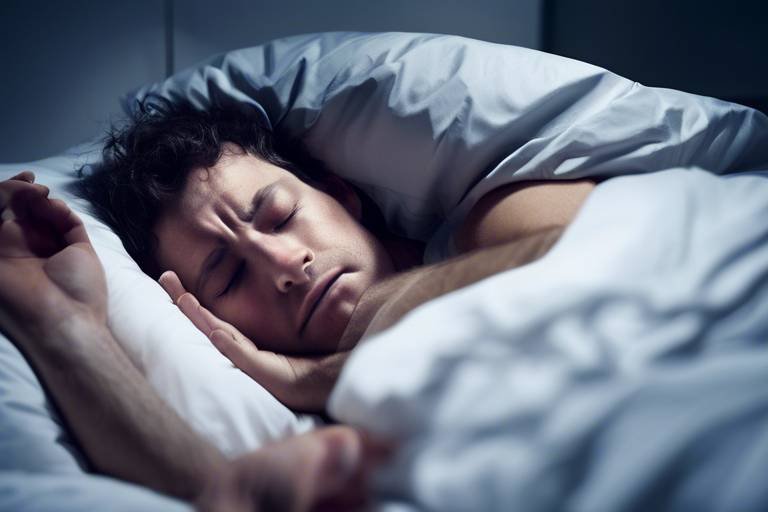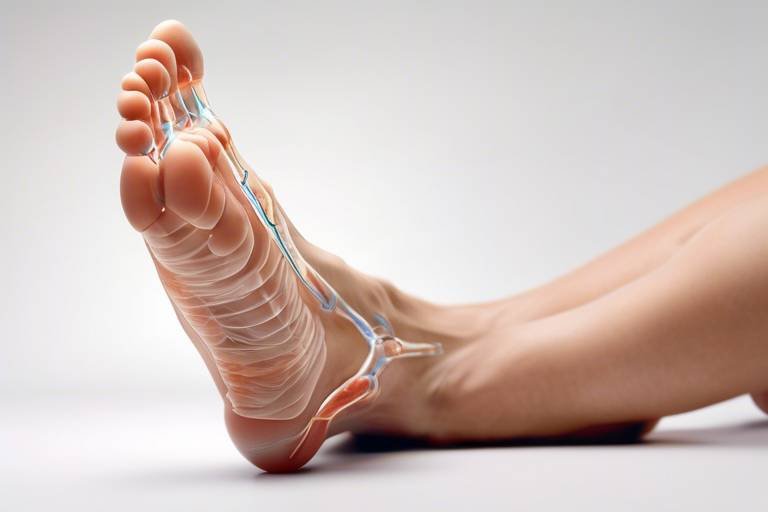How Sleep Affects Your Performance - The Science Explained
Sleep is not just a time for our bodies to rest; it’s a crucial period when our brains process information and rejuvenate our physical abilities. Have you ever found yourself struggling to concentrate during a long meeting or feeling sluggish during a workout? Chances are, your sleep—or lack thereof—could be the culprit. In this article, we will explore the intricate relationship between sleep and performance, diving deep into scientific findings that illustrate how quality sleep impacts cognitive function, physical abilities, and overall productivity. So, grab a comfy blanket and let’s delve into the fascinating world of sleep!
Quality sleep is essential for optimal cognitive performance. When we sleep, our brains go through various stages, each playing a unique role in enhancing our mental capabilities. During deep sleep, the body repairs itself, while REM sleep is where the magic happens for our minds. Have you ever noticed how a good night’s sleep can help you remember things better? That’s because sleep influences memory, attention, and problem-solving skills. Studies have shown that individuals who get enough quality sleep perform significantly better on cognitive tasks than those who are sleep-deprived. In fact, lack of sleep can lead to decreased attention span and impaired judgment, making it crucial to prioritize those precious hours of rest.
Just as sleep is vital for our brains, it’s equally important for our bodies. Sleep plays a critical role in physical performance, affecting everything from strength to endurance and recovery. Athletes often emphasize the importance of sleep, and for good reason. Adequate rest enhances athletic capabilities, allowing for better performance during training and competitions. Moreover, sleep helps in muscle recovery and repair, reducing the risk of injuries during physical activities. Imagine trying to run a marathon on just a few hours of sleep—your body simply won’t perform at its best. So, if you’re looking to boost your fitness levels, consider prioritizing your sleep as part of your training regimen.
Rapid Eye Movement (REM) sleep is a fascinating stage that occurs multiple times throughout the night. It’s during this phase that our brains are highly active, and this activity is crucial for emotional regulation and memory consolidation. Have you ever woken up from a vivid dream and felt like you learned something new? That’s because REM sleep contributes significantly to learning and the processing of information, impacting overall performance in various aspects of life. It’s during REM sleep that our brains organize and store memories, making it easier to recall information when we need it most.
But REM sleep isn’t just about memory; it also plays a vital role in emotional intelligence. This stage of sleep helps individuals manage stress and interact more effectively in social situations. Imagine walking into a high-pressure meeting feeling well-rested versus dragging yourself in after a sleepless night. The difference in your performance can be monumental. With adequate REM sleep, you’re more likely to approach challenges with a clear mind and a positive attitude, enhancing your performance in both personal and professional settings.
So, how can you improve your REM sleep quality? Here are some practical strategies to consider:
- Establish a Sleep Schedule: Go to bed and wake up at the same time every day.
- Create a Relaxing Bedtime Routine: Engage in calming activities before bed, such as reading or meditating.
- Limit Screen Time: Reduce exposure to screens at least an hour before sleeping.
- Optimize Your Sleep Environment: Keep your bedroom dark, quiet, and cool.
Implementing these strategies can significantly enhance the quality of your REM sleep, leading to better overall performance.
On the flip side, sleep deprivation can severely impair performance across various domains. Whether it’s a late-night study session or binge-watching your favorite series, sacrificing sleep can lead to cognitive and physical consequences. Lack of sleep can cause decreased alertness, poor decision-making, and even mood swings. Imagine trying to drive a car while half-asleep; it’s dangerous and can lead to disastrous outcomes. Prioritizing rest is not just a personal choice; it’s a necessity for optimal performance.
Not all sleep is created equal. It’s important to differentiate between sleep quality and quantity. While getting enough hours of sleep is crucial, the quality of that sleep is equally important. High-quality sleep means you’re going through all the necessary sleep stages effectively, allowing your body and mind to rejuvenate. So, it’s not just about how long you sleep, but how well you sleep. To improve your sleep quality, consider factors such as your sleep environment, lifestyle choices, and bedtime routines.
Understanding how to measure sleep quality can help individuals make informed adjustments to their sleep habits. There are various methods and tools available, such as sleep trackers, apps, and even simple journals where you can note your sleep patterns. By keeping track of how you feel after different sleep durations and qualities, you can tailor your sleep habits to maximize performance.
A conducive sleep environment is vital for achieving high-quality rest. Here are some factors to consider when optimizing your bedroom setup:
- Light: Keep your room dark to promote melatonin production.
- Noise: Use earplugs or white noise machines to block out disruptive sounds.
- Temperature: Maintain a cool room temperature for optimal sleep.
By creating an environment that promotes restful sleep, you’ll set yourself up for success in both your personal and professional life.
- How many hours of sleep do I need? Most adults require 7-9 hours of sleep per night for optimal performance.
- What are the signs of sleep deprivation? Common signs include fatigue, irritability, and difficulty concentrating.
- Can naps improve my performance? Yes, short naps can enhance alertness and performance if you’re feeling tired.
- How can I improve my sleep hygiene? Establishing a consistent sleep routine and optimizing your sleep environment are key factors.

The Importance of Sleep for Cognitive Function
Quality sleep is not just a luxury; it’s a fundamental necessity for optimal cognitive performance. Think of your brain as a powerful computer that requires regular updates and maintenance. Just like a computer, when you neglect to reboot it (or, in this case, get enough sleep), its performance can significantly lag. During sleep, particularly in the deeper stages, your brain is busy processing information, consolidating memories, and clearing out toxins that accumulate during the day.
Research shows that sleep significantly influences various cognitive functions, including memory, attention, and problem-solving skills. For instance, when you sleep, your brain engages in a process known as memory consolidation. This is when short-term memories are transformed into long-term ones, making it easier to recall information later. Imagine cramming for an exam without sleeping; you might retain some information temporarily, but the chances of it sticking long-term are slim. In fact, studies have demonstrated that individuals who get adequate sleep after learning new information perform better on tests than those who pull all-nighters.
Moreover, attention and focus are heavily dependent on the quality of your sleep. Have you ever noticed how hard it is to concentrate after a sleepless night? That’s because sleep deprivation can lead to increased distractibility and a decrease in your ability to process information efficiently. Without sufficient sleep, your brain's ability to filter out irrelevant stimuli diminishes, making it challenging to stay focused on the task at hand.
Different stages of sleep contribute uniquely to cognitive function. For example, REM sleep (Rapid Eye Movement sleep) is particularly vital for creative problem-solving and emotional regulation. During this stage, your brain is highly active, and it’s believed that the brain synthesizes and integrates new information, allowing for innovative thinking. In contrast, the deeper stages of non-REM sleep are crucial for restoring energy and repairing brain cells.
To illustrate the importance of sleep for cognitive function, consider the following table that summarizes how different sleep stages impact various cognitive processes:
| Sleep Stage | Cognitive Function Impact |
|---|---|
| Light Sleep | Initial processing of information; transition phase. |
| Deep Sleep | Memory consolidation; physical restoration. |
| REM Sleep | Emotional regulation; creativity; problem-solving. |
In conclusion, prioritizing quality sleep is essential for enhancing cognitive function. By ensuring you get enough restorative sleep, you not only improve your memory and attention but also enhance your overall ability to think critically and creatively. So, the next time you think about sacrificing sleep for productivity, remember that a well-rested brain is your best asset for peak performance!
- How many hours of sleep do I need for optimal cognitive function? Most adults require between 7 to 9 hours of quality sleep per night to function at their best.
- Can naps improve cognitive performance? Yes, short naps (20-30 minutes) can boost alertness and cognitive performance, especially if you are sleep-deprived.
- What are some signs of poor sleep quality? Difficulty concentrating, frequent forgetfulness, and irritability can all indicate poor sleep quality.

Sleep and Physical Performance
When it comes to physical performance, sleep is often the unsung hero. Many athletes and fitness enthusiasts may focus on their training regimen, nutrition, and supplements, but they often overlook the vital role that quality sleep plays in enhancing their performance. Imagine trying to drive a car on an empty tank; that’s what it’s like for your body without adequate rest. Sleep is not just a time for your body to recharge; it's a critical period when your muscles repair, your energy stores replenish, and your overall physical capabilities are optimized.
Research has shown that individuals who regularly get sufficient sleep tend to have better strength, endurance, and recovery rates compared to those who skimp on sleep. For instance, a study published in the Journal of Sports Medicine found that athletes who slept less than 7 hours per night experienced a decline in their performance metrics, such as speed, agility, and reaction time. This decline can be attributed to several factors, including impaired coordination and increased fatigue. It's like trying to run a marathon with a heavy backpack; the extra weight slows you down and makes every step feel laborious.
Moreover, sleep is crucial for recovery after intense physical exertion. During sleep, especially in the deep stages, the body releases growth hormones that are essential for muscle repair and growth. This means that getting enough quality sleep can help you bounce back faster after a workout, allowing you to train harder and more effectively in the long run. A well-rested athlete is more likely to push their limits and achieve their personal best.
To illustrate the relationship between sleep and physical performance, consider the following table:
| Sleep Duration | Performance Metrics | Recovery Rate |
|---|---|---|
| Less than 6 hours | Significantly impaired | Slow recovery |
| 6-7 hours | Moderate performance | Average recovery |
| 7-9 hours | Optimal performance | Fast recovery |
Additionally, sleep helps in regulating the body's hormonal balance, which is crucial for maintaining energy levels. When you don't get enough rest, cortisol, the stress hormone, can spike, leading to increased fatigue and decreased motivation for physical activity. This hormonal imbalance can create a vicious cycle—less sleep leads to more stress, which in turn leads to poorer performance and even lower sleep quality.
In conclusion, prioritizing sleep is not just a recommendation; it’s a necessity for anyone looking to improve their physical performance. Whether you're a professional athlete or a weekend warrior, understanding the profound impact of sleep on your body can help you unlock your full potential. So, the next time you consider sacrificing sleep for training or other commitments, remember: your body needs that time to recover and perform at its best.
- How many hours of sleep do I need for optimal performance? Most adults should aim for 7-9 hours of quality sleep each night to support physical and cognitive performance.
- Can napping improve my physical performance? Yes, short naps can help reduce fatigue and improve alertness, but they should not replace a full night's sleep.
- What are some signs that I am not getting enough sleep? Common signs include fatigue, irritability, decreased performance, and difficulty concentrating.

The Role of REM Sleep
Rapid Eye Movement (REM) sleep is one of the most fascinating stages of the sleep cycle, and it plays a pivotal role in our overall performance. During this stage, our brains are incredibly active, almost as if we are awake, and this is when most of our vivid dreaming occurs. But what exactly happens during REM sleep that makes it so crucial for our cognitive and emotional well-being?
First and foremost, REM sleep is essential for memory consolidation. When we learn something new, our brains need time to process and store that information. REM sleep facilitates this process by strengthening the neural connections that form our memories. Think of it as a nightly filing system where your brain organizes and categorizes all the data you’ve accumulated throughout the day. Without adequate REM sleep, not only does your ability to retain new information suffer, but your problem-solving skills can also take a hit.
Moreover, REM sleep is closely linked to emotional regulation. During this stage, our brains work to process emotions, helping us to better understand and cope with our feelings. This is why people often wake up feeling more refreshed and ready to tackle the day after a good night’s sleep. It’s like having a personal therapist working on your emotional state while you dream. A lack of REM sleep can lead to increased irritability and stress, making it challenging to perform at your best in both personal and professional settings.
To illustrate the significance of REM sleep, consider the following table that outlines the key functions of REM sleep:
| Function | Description |
|---|---|
| Memory Consolidation | Enhances the ability to retain and recall information. |
| Emotional Regulation | Helps process emotions and manage stress levels. |
| Learning Enhancement | Facilitates the assimilation of new skills and knowledge. |
| Creativity Boost | Encourages innovative thinking and problem-solving. |
In summary, REM sleep is not just a passive state of rest; it is a dynamic process that significantly impacts our cognitive function and emotional health. By prioritizing quality sleep, especially REM sleep, we can enhance our performance in various aspects of life. So next time you consider sacrificing sleep for productivity, remember that a well-rested mind is often the most productive one!

REM Sleep and Emotional Intelligence
Have you ever woken up from a dream and felt a wave of emotions wash over you? That’s the magic of REM sleep, or Rapid Eye Movement sleep, which plays a crucial role in shaping our emotional intelligence. During this stage of sleep, our brains are incredibly active, processing emotions and experiences from the day. This is not just a random occurrence; it’s a vital part of how we learn to navigate our feelings and relationships.
Emotional intelligence is the ability to recognize, understand, and manage our own emotions while also being able to empathize with the emotions of others. It’s a skill that can significantly impact our personal and professional lives. When we get enough REM sleep, we enhance our brain's ability to process emotional experiences, which helps us respond to situations with greater clarity and understanding. Think of REM sleep as a nightly emotional detox, enabling us to wake up refreshed and better equipped to handle the day’s challenges.
Studies have shown that individuals who consistently achieve sufficient REM sleep tend to have higher emotional intelligence scores. This is because REM sleep helps to consolidate memories and experiences, making it easier for us to reflect on our feelings and those of others. It’s like sharpening a tool; the more we allow our brains to process emotions during REM sleep, the more adept we become at using emotional intelligence in our daily interactions.
Moreover, the absence of adequate REM sleep can lead to emotional dysregulation. When we skimp on sleep, we might find ourselves overreacting to minor issues or misinterpreting social cues. This can create a ripple effect in our relationships, leading to misunderstandings and conflicts. To illustrate this, consider the following table that summarizes the effects of REM sleep on emotional intelligence:
| Aspect | With Adequate REM Sleep | With Insufficient REM Sleep |
|---|---|---|
| Emotional Regulation | High | Low |
| Empathy | Enhanced | Reduced |
| Stress Management | Effective | Ineffective |
| Conflict Resolution | Proficient | Challenging |
In conclusion, prioritizing REM sleep is not just about feeling rested; it’s about enhancing our emotional intelligence. By fostering a deeper understanding of our emotions and those around us, we can improve our interactions and relationships. So, the next time you consider sacrificing sleep for productivity, remember that a well-rested mind is a more emotionally intelligent one.
- How much REM sleep do I need? Most adults need about 1.5 to 2 hours of REM sleep each night, which typically occurs in cycles throughout the night.
- What can I do to increase my REM sleep? To enhance REM sleep, focus on maintaining a consistent sleep schedule, reducing stress before bedtime, and creating a comfortable sleep environment.
- Can napping help with REM sleep? Yes, short naps can increase the amount of REM sleep you get, especially if you’re sleep-deprived.

Strategies for Improving REM Sleep
Improving your REM sleep can significantly enhance your overall performance, both mentally and physically. But how do you ensure that you’re getting enough of this vital sleep stage? Well, there are several strategies that can help you optimize your sleep routine. First and foremost, establishing a consistent sleep schedule is crucial. Going to bed and waking up at the same time every day helps regulate your body’s internal clock, making it easier to enter REM sleep.
Another effective strategy is to create a relaxing bedtime routine. This could involve activities such as reading a book, meditating, or taking a warm bath. These practices signal to your body that it’s time to wind down, promoting a smoother transition into sleep. Additionally, consider limiting your exposure to screens at least an hour before bed. The blue light emitted by phones, tablets, and computers can interfere with your ability to fall asleep and reduce the quality of your REM sleep.
Moreover, your sleeping environment plays a significant role in the quality of your sleep. Ensure that your bedroom is dark, quiet, and cool. You might want to invest in blackout curtains or a white noise machine to block out distractions. The ideal temperature for sleep is generally between 60°F and 67°F (15°C and 19°C). Keeping your room within this range can help you achieve deeper sleep, including more REM cycles.
Nutrition also impacts your sleep quality. Avoid large meals, caffeine, and alcohol close to bedtime. Instead, consider a light snack that includes sleep-promoting nutrients, like a banana or a handful of nuts. Magnesium-rich foods, such as spinach and pumpkin seeds, can also help relax your muscles and improve sleep quality.
Lastly, regular physical activity can promote better sleep, but timing is essential. Exercising earlier in the day can help you sleep better at night. However, vigorous workouts right before bedtime might have the opposite effect. Aim for at least 30 minutes of moderate exercise most days, and you’ll likely find it easier to drift into a restful slumber.
By implementing these strategies, you can enhance your REM sleep and, in turn, boost your cognitive function and physical performance. Remember, it’s not just about the quantity of sleep you get, but the quality that truly makes a difference.
- What is REM sleep and why is it important?
REM (Rapid Eye Movement) sleep is a critical stage of sleep where most dreaming occurs and is essential for memory consolidation and emotional regulation. - How can I tell if I'm getting enough REM sleep?
While it's difficult to measure REM sleep without specialized equipment, feeling rested and alert during the day is a good indicator of sufficient REM sleep. - Can naps help improve REM sleep?
Short naps can enhance alertness and performance, but long naps may disrupt your nighttime sleep cycle, including REM sleep. - Is it possible to have too much REM sleep?
While REM sleep is beneficial, excessive amounts can sometimes indicate underlying sleep disorders, so it's important to maintain a balanced sleep cycle.

The Impact of Sleep Deprivation
Sleep deprivation is not just an inconvenience; it’s a significant barrier to optimal performance in every aspect of life. Imagine trying to drive a car with a foggy windshield—this is similar to how your brain functions when it lacks the necessary rest. When you skimp on sleep, your cognitive abilities take a nosedive, affecting your memory, decision-making, and problem-solving skills. Studies have shown that even one night of poor sleep can lead to a dramatic decrease in cognitive performance, akin to the effects of being legally intoxicated. This is alarming, especially in a world that demands high levels of productivity.
From a physical standpoint, the consequences of sleep deprivation are equally severe. Athletes, for instance, may find their strength and endurance plummeting after just a few nights of inadequate sleep. Research indicates that sleep-deprived individuals experience slower reaction times and diminished coordination, which can lead to increased risks of injury. In fact, a lack of sleep can slow down recovery after workouts, making it harder to bounce back and perform at peak levels.
Moreover, the psychological effects of sleep deprivation can create a vicious cycle. When you’re tired, your mood can take a hit, leading to increased irritability and stress. This emotional turmoil can further hinder your ability to focus and perform well, whether at work or in social situations. It’s like trying to run a marathon with a heavy backpack—every step feels like a struggle, and you can’t help but fall behind.
To put this into perspective, let’s look at some of the key impacts of sleep deprivation:
- Cognitive Impairment: Diminished attention span, memory lapses, and poor decision-making.
- Physical Decline: Reduced strength, slower reaction times, and increased risk of injuries.
- Emotional Instability: Heightened stress, irritability, and difficulty managing emotions.
- Long-term Health Risks: Increased susceptibility to chronic conditions such as obesity, diabetes, and cardiovascular diseases.
In conclusion, the impact of sleep deprivation is far-reaching and multifaceted. It’s not merely about feeling tired; it’s about how that fatigue can ripple through every area of your life, affecting your cognitive function, physical abilities, and emotional well-being. Prioritizing sleep is not just a luxury; it’s a necessity for anyone looking to perform at their best. As the saying goes, “You snooze, you lose”—and in this case, losing out on sleep means losing out on your potential.
Q1: How many hours of sleep do I need?
A1: Most adults need between 7 to 9 hours of sleep per night for optimal performance and health.
Q2: What are the signs of sleep deprivation?
A2: Common signs include fatigue, irritability, difficulty concentrating, and frequent yawning.
Q3: Can napping help with sleep deprivation?
A3: Yes, short naps can help alleviate some effects of sleep deprivation, but they shouldn’t replace a full night’s sleep.
Q4: What are some tips for improving sleep quality?
A4: Establishing a regular sleep schedule, creating a relaxing bedtime routine, and optimizing your sleep environment can significantly improve sleep quality.

Sleep Quality vs. Sleep Quantity
When it comes to sleep, many people often focus solely on the quantity of hours they spend in bed, but this approach can be misleading. It's not just about how long you sleep; it's also about how well you sleep. In fact, sleep quality plays a crucial role in determining how refreshed and functional you feel during the day. Imagine trying to drive a car with a half-full fuel tank; it might run, but not nearly as efficiently as it would with a full tank. Similarly, your brain and body need quality sleep to operate at their best, regardless of the number of hours spent asleep.
To illustrate this concept, let’s break down the differences between sleep quality and sleep quantity:
| Aspect | Sleep Quantity | Sleep Quality |
|---|---|---|
| Definition | Total hours of sleep obtained | How restorative and uninterrupted the sleep is |
| Measurement | Hours on the clock | Sleep cycles, interruptions, and feelings upon waking |
| Impact on Performance | Can lead to fatigue if too low | Can enhance cognitive and physical abilities even with fewer hours |
Research suggests that while most adults need between 7 to 9 hours of sleep per night, the quality of that sleep is what truly matters. For instance, a person might sleep for eight hours but wake up feeling groggy and unfocused if their sleep was interrupted or not deep enough. In contrast, someone who sleeps for just six hours of high-quality, uninterrupted sleep might feel more alert and productive. This is because quality sleep allows the body to cycle through the necessary stages, including REM sleep and deep sleep, which are vital for recovery and cognitive function.
So, how can you ensure you’re getting both quality and quantity in your sleep? Here are some practical tips:
- Establish a consistent sleep schedule by going to bed and waking up at the same time every day.
- Create a relaxing bedtime routine to signal your body that it’s time to wind down.
- Limit exposure to screens and bright lights before bed, as these can interfere with your body's natural sleep-wake cycle.
- Make your sleep environment as comfortable as possible—consider factors like temperature, noise, and light.
In conclusion, while it’s essential to aim for the recommended hours of sleep, it’s equally important to focus on the quality of that sleep. By prioritizing both aspects, you can significantly enhance your overall performance, whether it’s at work, in sports, or in daily life. Remember, when it comes to sleep, it’s not just about the quantity; it’s about how restorative that time is!
- How much sleep do I really need? Most adults require between 7 to 9 hours of sleep each night, but individual needs may vary.
- What are the signs of poor sleep quality? Waking up frequently during the night, feeling tired upon waking, and experiencing difficulty concentrating can indicate poor sleep quality.
- Can I improve my sleep quality? Yes! Implementing good sleep hygiene practices, such as maintaining a consistent sleep schedule and creating a comfortable sleep environment, can greatly improve sleep quality.

Measuring Sleep Quality
Understanding how to measure sleep quality is crucial for anyone looking to improve their overall health and performance. Unlike sleep quantity, which simply accounts for the number of hours you spend in bed, sleep quality delves deeper into the effectiveness of that sleep. A night filled with tossing and turning may last eight hours, but if it leaves you feeling groggy and unfocused, then it’s time to reassess your sleep habits. So, how can we determine if our sleep is truly restorative?
There are several methods and tools available that can help you gauge the quality of your sleep. One popular approach is to keep a sleep diary. This involves jotting down details about your sleep patterns, including when you go to bed, when you wake up, how many times you wake up during the night, and how you feel in the morning. Over time, this can reveal patterns and help you identify factors that may be affecting your sleep.
Another effective method is using sleep tracking devices. These gadgets can range from smartwatches to dedicated sleep trackers that monitor your movements, heart rate, and even your breathing patterns while you sleep. Many of these devices provide insights into your sleep stages, including light, deep, and REM sleep, allowing you to see how long you spend in each phase. This data can be invaluable for understanding your sleep quality.
Additionally, you can consider using various apps designed to analyze your sleep. These apps often utilize your smartphone’s sensors to track your sleep cycles and offer personalized recommendations for improvement. They might also include features like soothing sounds or guided meditations to help you fall asleep more easily.
To give you a clearer picture, here’s a simple table summarizing some common methods for measuring sleep quality:
| Method | Description | Pros | Cons |
|---|---|---|---|
| Sleep Diary | A manual log of your sleep patterns. | Easy to implement; no cost. | Requires consistency and may be subjective. |
| Sleep Tracking Devices | Wearable technology that monitors sleep. | Provides detailed data on sleep stages. | Can be expensive; may not be 100% accurate. |
| Sleep Apps | Mobile applications for sleep analysis. | Convenient; often includes additional features. | Dependent on smartphone usage; may require purchase. |
Ultimately, measuring your sleep quality is about finding the right combination of methods that work for you. By keeping track of your sleep patterns and utilizing available technology, you can make informed adjustments to your habits and create a more restorative sleep experience. Remember, the goal isn’t just to clock in hours of sleep but to wake up feeling refreshed and ready to tackle the day!
- How much sleep do I need for optimal performance?
Most adults require between 7 to 9 hours of quality sleep per night for optimal cognitive and physical performance. - Can I catch up on sleep during the weekends?
While catching up on sleep can help, it’s not a substitute for consistent, quality sleep during the week. - What are the signs of poor sleep quality?
Common signs include feeling tired during the day, difficulty concentrating, mood swings, and frequent awakenings at night.

Creating a Sleep-Conducive Environment
Creating a sleep-conducive environment is essential for achieving high-quality rest that rejuvenates the body and mind. Imagine your bedroom as a sanctuary where every element is carefully curated to promote tranquility and relaxation. The right atmosphere can transform your sleep experience, making it easier to drift off and stay asleep throughout the night. So, what are the key components to consider when setting up your sleep haven?
First and foremost, light plays a crucial role in regulating your sleep-wake cycle. Exposure to bright lights, especially blue light from screens, can trick your brain into thinking it's still daytime. To combat this, consider investing in blackout curtains that block out external light sources, creating a darkened space that signals your body it's time to wind down. Additionally, using dimmable lights in the evening can help ease the transition into sleep mode.
Next up is noise. A quiet environment is vital for uninterrupted sleep. If you live in a noisy area, white noise machines or apps can be a game-changer. They create a consistent sound that masks disruptive noises, allowing you to fall asleep faster and stay asleep longer. Alternatively, earplugs can also be effective in blocking out unwanted sounds, ensuring a peaceful night's rest.
Another important factor is the temperature of your bedroom. Studies suggest that a cooler room, typically between 60 to 67 degrees Fahrenheit (15 to 19 degrees Celsius), is ideal for optimal sleep. This range helps lower your body temperature, signaling to your brain that it’s time to sleep. To achieve this, consider using a fan, air conditioning, or even breathable bedding materials that promote airflow.
Lastly, let’s not forget about the bed and bedding itself. Your mattress and pillows should provide the right balance of support and comfort. A mattress that is too firm or too soft can lead to discomfort and restless nights. It’s worth investing in a quality mattress that suits your sleeping style. Additionally, choose pillows that support your neck and head in a neutral alignment, as this can significantly affect your sleep quality.
In summary, creating a sleep-conducive environment involves a harmonious blend of light, noise control, temperature regulation, and comfortable bedding. By paying attention to these elements, you can transform your bedroom into a restful retreat that fosters deep, restorative sleep.
- What is the ideal temperature for sleeping? The ideal sleeping temperature is generally between 60 to 67 degrees Fahrenheit (15 to 19 degrees Celsius).
- How can I block out noise while sleeping? You can use white noise machines, earplugs, or soundproofing techniques to minimize disruptive sounds.
- What type of mattress is best for sleep quality? A mattress that provides a balance of support and comfort, tailored to your sleeping style, is recommended.
- How important is light control for sleep? Light control is crucial as it helps regulate your circadian rhythm and signals your body when to sleep.
Frequently Asked Questions
- How does sleep affect cognitive performance?
Quality sleep is crucial for cognitive functions like memory, attention, and problem-solving. During sleep, our brains process and consolidate information, which enhances mental clarity and sharpness. Without adequate sleep, these cognitive abilities can decline, making it harder to focus and think critically.
- What is the relationship between sleep and physical performance?
Sleep significantly impacts physical performance by influencing strength, endurance, and recovery. Athletes who prioritize sleep often experience better performance, quicker recovery times, and a reduced risk of injuries. Essentially, a well-rested body can perform at its peak.
- Why is REM sleep important?
Rapid Eye Movement (REM) sleep is vital for emotional regulation and memory consolidation. It plays a key role in learning new information and processing experiences, which can enhance overall performance in various aspects of life, including work and social interactions.
- How can I improve my REM sleep quality?
Improving REM sleep can be achieved through various strategies, such as establishing a consistent sleep schedule, creating a relaxing bedtime routine, and minimizing exposure to screens before bed. Additionally, maintaining a comfortable sleep environment can also enhance the quality of your REM sleep.
- What are the effects of sleep deprivation?
Sleep deprivation can lead to significant cognitive and physical impairments, including reduced attention span, poor decision-making, and decreased athletic performance. Prioritizing sleep is essential for maintaining optimal performance levels across all areas of life.
- How do sleep quality and quantity differ?
While sleep quantity refers to the total hours of sleep, sleep quality relates to how restorative that sleep is. Both aspects are important for optimal performance. Focusing on improving sleep quality can lead to more effective rest, even if the total hours are slightly less.
- What methods can I use to measure sleep quality?
There are various methods to assess sleep quality, including sleep tracking apps, wearable devices, and sleep diaries. These tools can help you identify patterns and make informed adjustments to your sleep habits for better rest.
- How can I create a sleep-conducive environment?
To optimize your sleep environment, consider factors such as lighting, noise levels, and room temperature. Aim for a dark, quiet, and cool space to promote better sleep quality. Investing in comfortable bedding can also make a significant difference in your overall sleep experience.



















